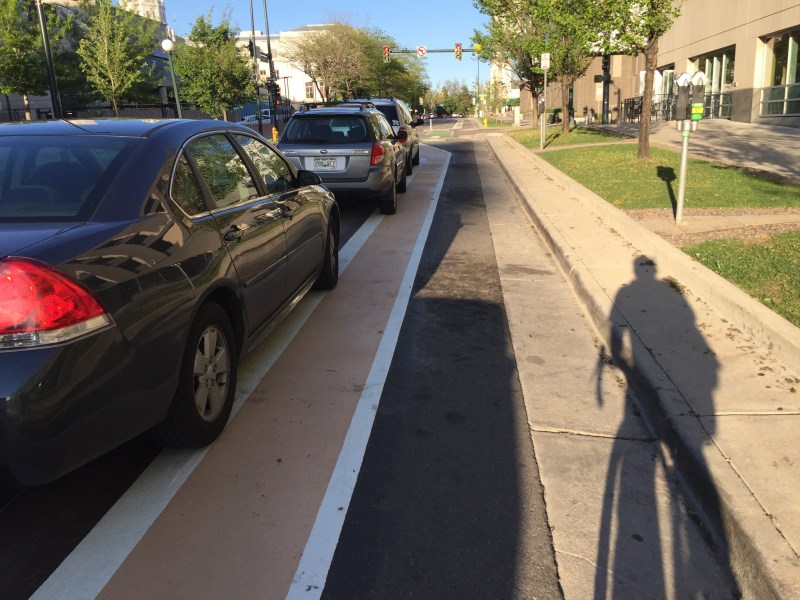5 Steps Forward From the 2017 Colorado Legislative Session

Yesterday we took a look at some of the setbacks that Colorado legislators delivered to transit, walking, and biking — and they were hefty.
But the 2017 General Assembly wasn’t all bad. Lawmakers made progress on some issues — mainly related to dangerous driving and car pollution. By and large, though, these bills did not tackle the big transportation problems facing Denver and other Colorado cities.
Steeper fines for texting while driving
Under Senate Bill 27, people caught texting while driving may pay a $300 fine and get four points toward a suspended license. That’s up from the current $50 fine and one point on the license. (It takes 12 points in one year to lose a license for adults 21 and older, and six to nine points for drivers under 21.)
However, the law is only enforceable if police officers witness a person texting and witness them driving in a “careless and imprudent manner.” In other words, it’s enforceable after drivers endanger other people and themselves, and possibly only after the damage is done.
A $100 fine for “rolling coal”
There’s this weird thing some truck owners do in Colorado: They rig their vehicles to spew thick, black exhaust onto people walking and biking. The smog clogs people’s lungs and obscures the vision of anyone else who happens to be on the street at the same time.
Senate Bill 278 made the act a $100 fine.
“It’s a bill that intends to mitigate or reduce behavior by a motorist that really consists of harassment,” said Bicycle Colorado Policy Director Ted Heyd. “That was the word that typically came up in the hearings. And it’s not just bicyclists… it’s pedestrians, it can be other motorists.”
Clarification on electric bicycles
Bikes with an electric motor to assist riders have gained popularity in Asia and Europe in recent years, and are starting to get more attention in the United States. While e-bikes are already street legal, the distinctions between different types aren’t well-understood.
House Bill 1151, supported by Bicycle Colorado and People for Bikes, classifies e-bikes by three categories:
- Class 1: Bikes with a motor that that requires pedaling and maxes out at 20 mph
- Class 2: Bikes with a motor that doesn’t require pedaling and maxes out at 20 mph
- Class 3: Bikes with a motor that requires pedaling and maxes out at 28 mph
“For consumers, the law lets people better understand what they’re getting,” Heyd said. “From a retail side, it lets you explain to your customer what you’re selling.”
Regional transit authorities continue
House Bill 1018 extended the authority of local governments to band together and form regional transit agencies, or RTAs, which can raise revenue through mill levies.
The ability to raise transit funding through property taxes — with voter approval — means more robust transit systems. The alternative is individual localities simply funding transit service on their own.
“Given that [the multimodal funding bill] just failed, that was an important bill, because it’s gonna allow more communities, if they want to, to go this route,” said Danny Katz, director of the Colorado Public Interest Research Group. “They still have to find the money, though.”
Flee a crash site, lose your license
It’s not news that drivers who flee the scene of a crash can lose their license once convicted. But House Bill 1277 lets the state Department of Revenue suspend licenses prior to that if evidence shows that the driver left a crash scene involving serious bodily injury or death.
Proponents hope the bill encourages witnesses to stay at crash sites and helps authorities understand the factors that cause to traffic deaths and injuries.
All bills have been sent to Governor Hickenlooper for his signature, though the e-bike and RTA legislation are the only ones to receive it so far.


